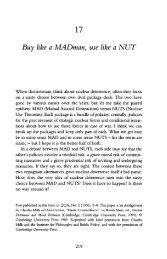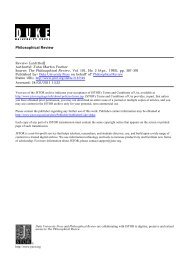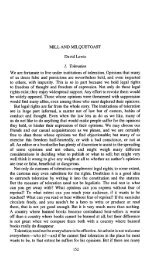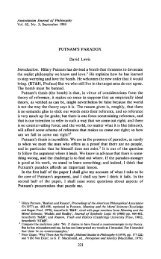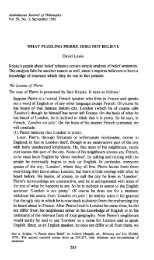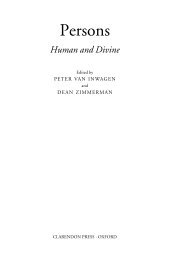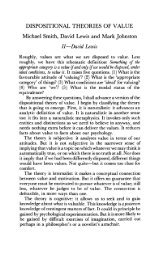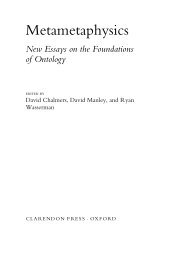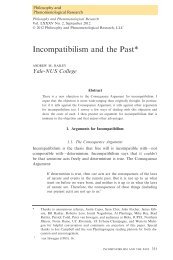Tooley and Evil - Andrew M. Bailey
Tooley and Evil - Andrew M. Bailey
Tooley and Evil - Andrew M. Bailey
- No tags were found...
You also want an ePaper? Increase the reach of your titles
YUMPU automatically turns print PDFs into web optimized ePapers that Google loves.
Downloaded by [University of Notre Dame] at 11:51 14 April 201274 <strong>Tooley</strong> <strong>and</strong> <strong>Evil</strong>: A ReplyNow it must be conceded that McCloskey's article doesn't do much by way ofsubstaining this claim; but that is scarcely grounds for supposing that he didn'tmean to make it. In any event, if McCloskey didn't mean to claim that there is acontradiction here, then he has expressed himself badly indeed. Given that hesays there is a contradiction here, it is not at all surprising that people shouldthink he meant to say that there is a contradiction here.So much for the misrepresentation charge. How about the 'misemphasis'?According to <strong>Tooley</strong>, 'Plantinga focuses attention upon the wrong version ofthe argument, <strong>and</strong> in attempting to justify this decision, he seriouslymisrepresents the claims made by many proponents of the argument from evil'.(p. 360) In his concluding peroration he adds that 'the logical incompatibilityversion of the argument from evil is not one of the crucial versions' <strong>and</strong> that'Plantinga, in attempting to foster the illusion that it is, is guilty of seriouslymisrepresenting the claims made by contemporary proponents of the argumentfrom evil'. (p. 375) We have already seen what there is to be said forthe charge of serious misrepresentation. What about the other charge b that Ifocus attention upon the wrong version of the argument? <strong>Tooley</strong> complainsseveral times in this piece <strong>and</strong> in his review of The Nature of Necessity that Idevote almost thirty pages to the incompatibility thesis <strong>and</strong> less than three to theprobabilistic argument. On this point <strong>Tooley</strong> is correct (<strong>and</strong> if that proportionconstitutes, as he says, one of my 'misemphases', then I have redressed thebalance in 'The Probabilistic Argument from <strong>Evil</strong> '7 where I devote more thanfifty pages to the probabilistic argument <strong>and</strong> less than two to the incompatibilitythesis). But was it a 'misemphasis'? I believe the probabalistic argument is themore important -- now. For now, as opposed to twenty or twenty-five yearsago, most atheologians have conceded that in fact there isn't any inconsistencybetween the existence of an omnipotent, omniscient <strong>and</strong> wholly good God <strong>and</strong>the existence of the evil the world contains. It was not always thus, however,<strong>and</strong> prior to twenty years ago nearly every atheologian who offered anargument from evil, urged some version of the incompatibility thesis. It isheartening to see that the atheologians are giving up the incompatibility thesis<strong>and</strong> are now prepared to concede that there is no contradiction here: that'sprogress. But the claim that they never meant to say there was one, is, in viewof their own explicit statements, a bit hard to credit.III The Probabilistic ArgumentI turn finally to <strong>Tooley</strong>'s comments on what I say (in The Nature of Necessity)on the probabilistic argument from evil. This is in a way less important; thatthree page discussion has been superseded by 'The Probabilistic ArgumentFrom <strong>Evil</strong>'. Nevertheless I'd like to set the record straight.The version of this argument I considered involves the contention that(1) God exists <strong>and</strong> is omnipotent, omniscient <strong>and</strong> wholly goodmay perhaps be logically compatible with statements like7 Philosophical Studies 1979, pp. 1-53.




